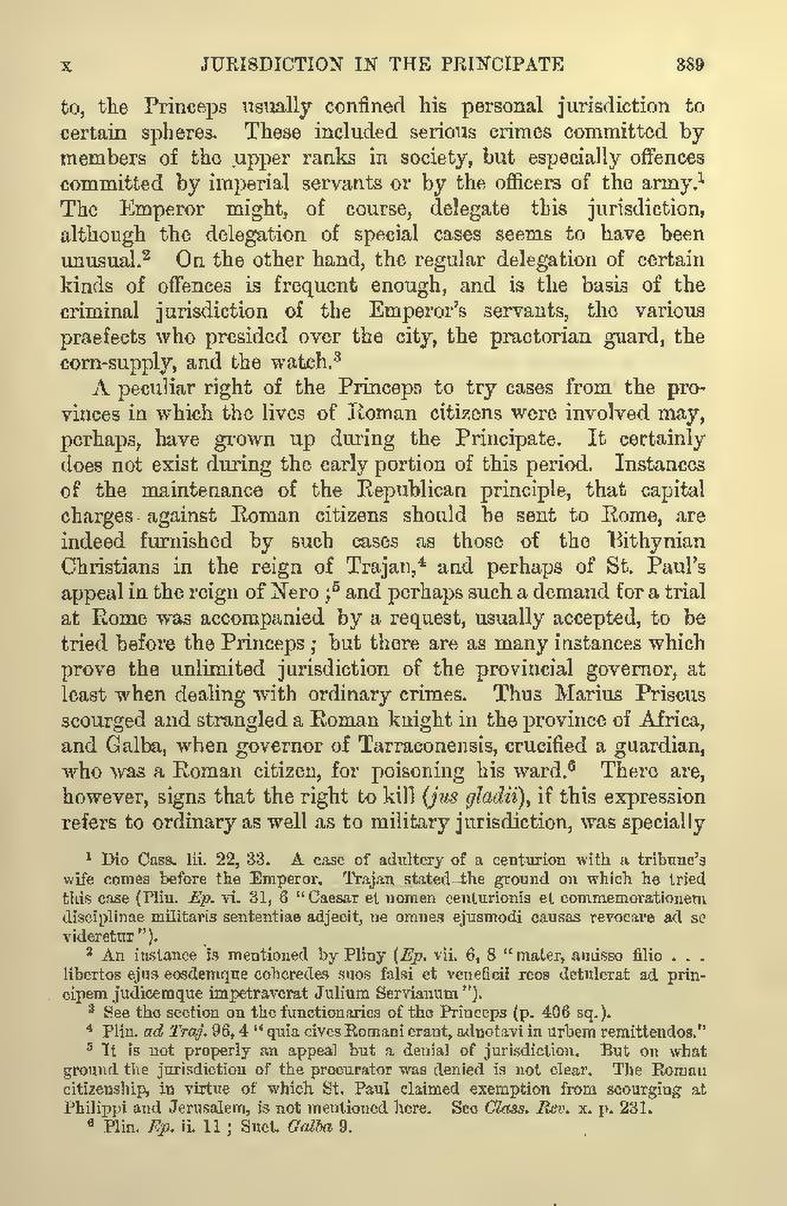to, the Princeps usually confined his personal jurisdiction to certain spheres. These included serious crimes committed by members of the upper ranks in society, but especially offences committed by imperial servants or by the officers of the army.[1] The Emperor might, of course, delegate this jurisdiction, although the delegation of special cases seems to have been unusual.[2] On the other hand, the regular delegation of certain kinds of offences is frequent enough, and is the basis of the criminal jurisdiction of the Emperor's servants, the various praefects who presided over the city, the praetorian guard, the corn-supply, and the watch.[3]
A peculiar right of the Princeps to try cases from the provinces in which the lives of Roman citizens were involved may, perhaps, have grown up during the Principate. It certainly does not exist during the early portion of this period. Instances of the maintenance of the Republican principle, that capital charges against Roman citizens should be sent to Rome, are indeed furnished by such cases as those of the Bithynian Christians in the reign of Trajan,[4] and perhaps of St. Paul's appeal in the reign of Nero;[5] and perhaps such a demand for a trial at Rome was accompanied by a request, usually accepted, to be tried before the Princeps; but there are as many instances which prove the unlimited jurisdiction of the provincial governor, at least when dealing with ordinary crimes. Thus Marius Priscus scourged and strangled a Roman knight in the province of Africa, and Galba, when governor of Tarraconensis, crucified a guardian, who was a Roman citizen, for poisoning his ward.[6] There are, however, signs that the right to kill (jus gladii), if this expression refers to ordinary as well as to military jurisdiction, was specially
- ↑ Dio Cass. lii. 22, 33. A case of adultery of a centurion with a tribune's wife comes before the Emperor. Trajan stated the ground on which he tried this case (Plin. Ep. vi. 31, 6 "Caesar et nomen centurionis et commemorationem disciplinae militaris sententiae adjecit, ne omnes ejusmodi causas revocare ad se videretur").
- ↑ An instance is mentioned by Pliny (Ep. vii. 6, 8 "mater, amisso filio . . . libertos ejus eosdemque coheredes suos falsi et veneficii reos detulerat ad principem judicemque impetraverat Julium Servianum").
- ↑ See the section on the functionaries of the Princeps (p. 406 sq.).
- ↑ Plin. ad Traj. 96, 4 "quia cives Romani erant, adnotavi in urbem remittendos."
- ↑ It is not properly an appeal but a denial of jurisdiction. But on what ground the jurisdiction of the procurator was denied is not clear. The Roman citizenship, in virtue of which St. Paul claimed exemption from scourging at Philippi and Jerusalem, is not mentioned here. See Class. Rev. x. p. 231.
- ↑ Plin. Ep. ii. 11; Suet. Galba 9.
